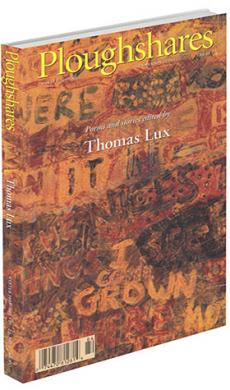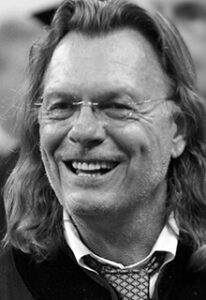rev. of The End of the Alphabet by Claudia Rankine
The End of the Alphabet
Poems by Claudia Rankine. Grove, $20.00 cloth. Reviewed by Michael J. Carter.
In Claudia Rankine’s new collection,
The End of the Alphabet, the always tenuous relationship between language and felt experience is stretched nearly to its limit: “The moment / of elucidation snipped its tongue.” Anguishing and fragmented, the voice in these poems relies heavily on broken syntax, unreliable grammatical structures — open parentheses and hyphens abound — because inner and outer forms have collapsed. Here is a speaker operating from severe dislocation, perhaps insanity, where the calculus between internal and external realities is conflicted at best, disassociated at worst. The book begins: “Difficult to pinpoint, / / fear of self, uncoiled.” Not a fresh idea, nor are these poems formally striking, but what fuels this collection is the emotional current and urgency of the writing.
Idiosyncratic,
The End of the Alphabet is a deeply embedded dialogue within the self. Without a coherent narrative, this dialogue wrestles with the “inherent indeterminacy” of language and experience. “Assurance collapses naturally / as if each word were a dozen rare birds / flown away. And gone / / elsewhere is their guaranteed landing.” Unable to track within the common bounds of meaning, Rankine’s narrator, who refers to herself as Jane, floats in a netherworld of displaced meaning. It’s as if she were a postmodern Persephone who has eaten the seeds of despair and must carry them forth, back into the living world: ” — wanting and the body losing, all the time / losing, beforehand, inside.” Yet this insistent losing does lift in moments of recognition of the outside world: “enveloped again by movement, before, finally, / the outside tap turns tentatively on — ”
The End of the Alphabet could have lapsed into myopia if it didn’t ascend occasionally out of the pressurized private dialogues that mark much of the collection: “. . . Clearly, you know, / so say, This earth untouched is ruptured enough to grieve.” Beside the lovely musicality of these lines lies a momentary transcendence into identification, a glimpse of the broken-hearted world. As Jane says, “Just as the lips open open the eyes.” This is the crux of the book, “To locate the self salvaged.” Yet to find one’s self in the world depends in some part on the ability to give it form using language. The problem for the narrator is, “Our addiction to telling / is effort to shape what surfaces within the sane.” And the speaker does not feel sane. “Vulgarized by breath, plundered, handed round, I ask you,
how / how to have lived this?”
How indeed. Despair and loss of meaning in
The End of the Alphabet are palpably realized by Rankine. This is a long look into the enervating dark of a postmodern soul fissured by loss. But this is not so much a depressing celebration of darkness as it is an attempt at healing (despite the overuse of that word in politics and self-help). As Rankine writes: “The day I am at peace I will have achieved / a kind of peace even I know suggests I am crazy. / But, as it will be how I survive, I will not feel so.”
Michael J. Carter is a poet living in Boston. He is co-editor with Diann Blakely of Each Fugitive Moment,
a collection of essays on Lynda Hull.

